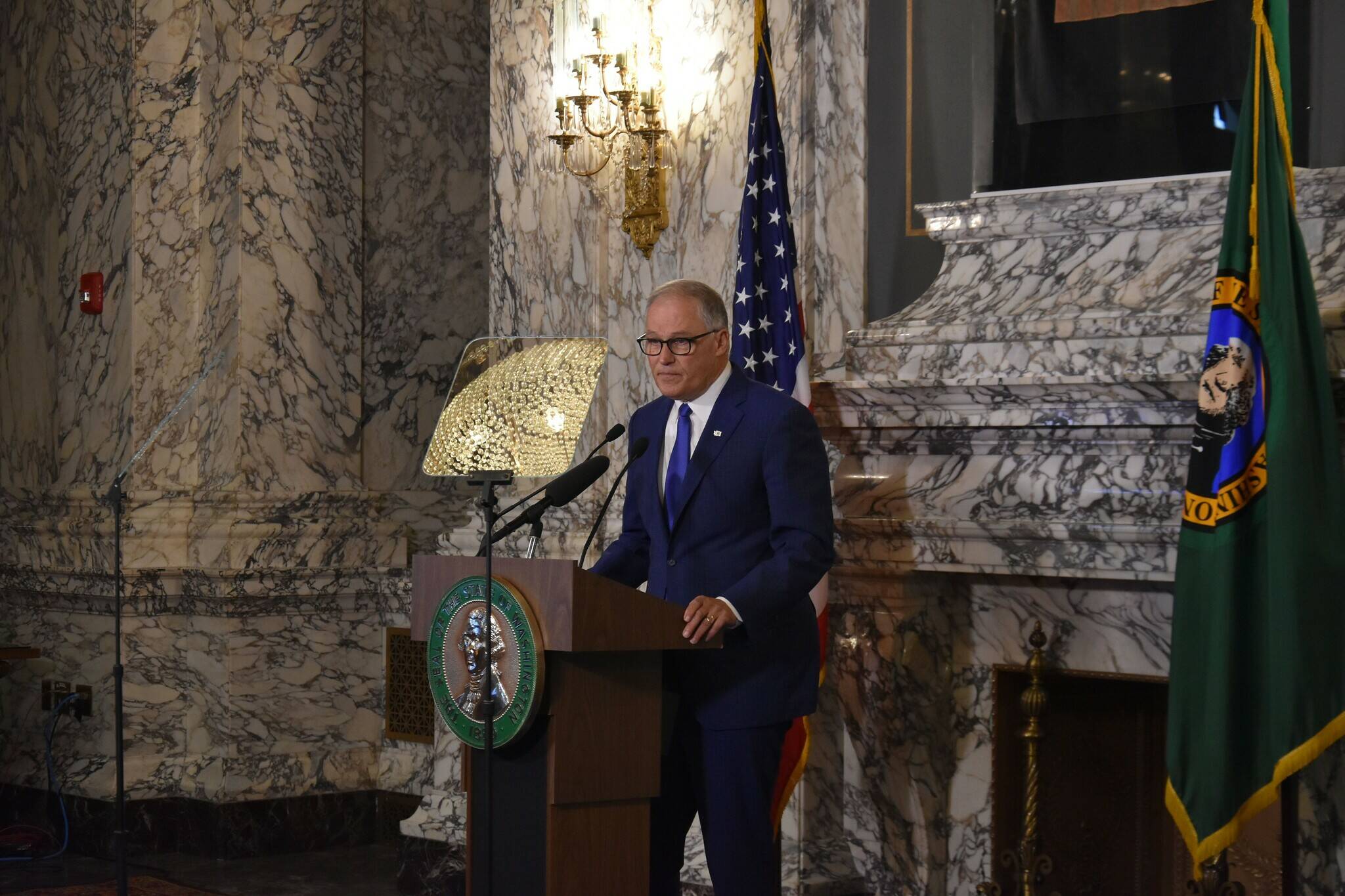OLYMPIA — Washington Gov. Jay Inslee on Tuesday, Jan. 11, touted his proposals to address homelessness, poverty, mental health issues and climate change, and pressed lawmakers to make it easier to build townhomes and duplexes to ease the state’s dire housing shortage.
In a nod to both the COVID-19 pandemic and fears over security, Inslee delivered his annual State of the State address in a Capitol temporarily closed to the public around the time of the speech.
Inslee spoke in the Capitol building’s State Reception Room to an audience consisting only of journalists, who were spaced apart and had received negative coronavirus test results the day before. The House and Senate introduced Inslee by teleconference in a joint session — where, before the pandemic, governors would give the speech in front of lawmakers of both chambers.
In his speech, the governor thanked health workers, emergency responders and others working daily amid the pandemic, and offered his condolences to the family of Sen. Doug Ericksen, a longtime Republican lawmaker who died last month after testing positive for the virus.
And the governor urged lawmakers — who began the 60-day legislative session this week — to move forward on a host of pressing issues.
“I can encapsulate the state of our state very simply — we need action,” Inslee said.
“We can wake up every morning the next 60 days understanding we need ‘action, this day’ — which was Churchill’s first order at the beginning of World War II, but it serves to focus on the many tasks before us,” the governor added.
Last month, Inslee proposed a state supplemental budget that uses existing tax collections and federal COVID aid to add billions in spending and add to the state’s reserve accounts without new taxes.
That proposal spends $815 million on housing and homelessness, including more than $334 million to acquire existing property and buildings around Washington to be converted into housing and homeless shelters. The governor has estimated that it will add roughly 2,460 housing units of various types.
Inslee is additionally advocating for a bill that would increase housing density in cities.
The governor has also proposed, among other things, dedicating $100 million per year to fund rebates for people buying electric vehicles and another $100 million to expand the use of solar energy, and $187 million to help protect salmon.
He talked up the clean energy economy being built in Washington, including “new solar farms popping up like dandelions in Eastern Washington.”
The decision to close the Capitol for the speech came at the request of Inslee’s staff, according to Tara Lee, spokesperson for the governor.
The temporary closure comes after lawmakers and the governor last year occupied a Capitol that was closed to the public for the entire session amid the pandemic and civil unrest.
Early on, hundreds of National Guard soldiers stood sentry as last year’s legislative session began just days after the Capitol insurrection in Washington, D.C., and a protest in Olympia the same day where demonstrators breached the gates of the governor’s residence and chanted slogans on his lawn.
“No specific threats, out of caution,” Lee wrote in an email. “Our office staff requested it, not the governor.”
In his speech, Inslee returned to the insurrection and — like he did last week — called on Republicans to denounce three GOP state lawmakers who traveled to an election symposium in South Dakota that focused on debunked conspiracy theories.
In a regularly-scheduled news availability later in the day, several Republican leaders repeated again that they believe in and accepted that the election results — which in Washington were overseen by a GOP secretary of state — were valid.
“I believe in elections so much that I think that if politicians are caught lying, elections are the right way to deal with them,” said House Minority Leader J.T. Wilcox, R-Yelm.
Democratic lawmakers this session are expected to explore changes to some of the new policing laws passed last year, and fixes to Washington’s long-term care program. They are also expected to address funding for transportation projects and salmon recovery, and continuing the coronavirus response.
Sen. David Frockt, D-Seattle, praised Inslee’s speech, saying the governor has long made persuasive arguments on the need to confront climate change.
Meanwhile, “I definitely welcomed his emphasis on housing and homelessness, in particular, the money for rapid housing,” added Frockt.
Republicans, who are in the minority in the Legislature and have felt shut out of the COVID response, have called again for changes to the broad executive powers that Inslee has used to issue emergency orders in response to the pandemic.
The governor, who has weathered such complaints for well over a year, in his speech pointed out that Democrats in the Legislature voted last session to extend 26 emergency orders.
Immediately after Inslee spoke Tuesday, state Sen. Chris Gildon gave the official Republican response, and called again for limiting a governor’s emergency powers.
Gildon, a Republican from Puyallup, said, “It’s well past time to move away from emergency rule.”
“We need to return to the rule of law, where each of our three branches of government fulfill their constitutional mandate to serve as a check and a balance on the other,” he added.
As lawmakers sprint through committee hearings in the coming days, they’ll see another new face. The Whatcom County Commission Tuesday appointed Simon Sefzik to fill the vacancy created by the death of Ericksen in the 42nd District.
At 22 years old, Sefzik will be the youngest lawmaker in the current Legislature. A graduate of Patrick Henry College in Virginia, according to a news release, Sefzik has held internships at the U.S. House of Representatives and the White House Coronavirus Task Force, and worked for a time as a White House staffer.


